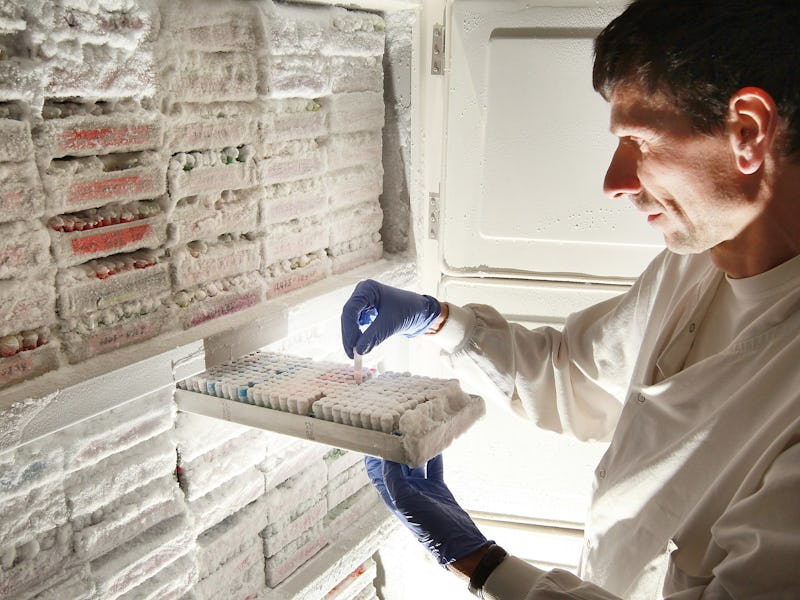Data Written on DNA Will Be Stored in Freezer Banks in 7 Years
No, DNA storage won't replace your hard drive.

In five to seven years, Nick Goldman, senior scientist with the European Bioinformatics Institute, says we may be able to toss those old, faded photo albums, and backup hard drives gathering dust, because the future of data storage is DNA.
This month, Microsoft demonstrated the ability to store a record-breaking 200-megabytes of data into DNA, yes, the same deoxyribonucleic acids that make up who we are as human beings. That strand of molecules, no bigger than the tip of a pencil, held 100 books, documents in more than 100 languages, and an OK Go music video. Goldman thinks we’re not too far off from storing all the important documents of our lives onto DNA and having them shipped off to a freezer bank.
“In 5-7 years I hope the production of DNA will get a lot faster and cheaper and there will actually be companies out there selling a product,” Goldman tells Inverse. “You probably won’t have it on your own desk, but as a consumer there may be a service where you upload files over the internet to a company, and they will print that DNA for you, and they will either store it somewhere, or send it back to you and say ‘stick it in the freezer and its good for 100 years or so.’”
Goldman was one of the first to demonstrate DNA’s electronic storage capabilities when he and his team wrote 739 kilobytes of data onto DNA in 2013. He says it started with the human genome project and the difficulty of sending large sets of data about human DNA via flash drives and the internet. Now, those biological research incentives are giving way to consumer uses.
There are several advantages to storing data on DNA: it’s potentially small enough to store the entirety of the internet in a shot glass, it’s more secure than cloud-based storage because it’s not inherently linked to the internet, and scientists have shown it can last thousands of years.
“We’re really confident there will always be a reader, because as long as there are humans interested in their own health and the environment around them, we’re always going to have DNA readers,” Goldman says, adding that the same can’t be said of Betamax readers or any other current tech.
Glenn, the Facilities Manager, gives Jenny a tour of the rows and rows of servers at the Mayes County Google data center.
It’s easy to get swept up and think all hard drives and cloud storage might one day be replaced by DNA. But, that future is very cost prohibitive, Goldman says.
“It’s not going to replace your hard drive, but the price can come down to something where individuals can say ‘yeah, I’ll get that written to DNA, then we’ll have a copy and we’ll give it to everyone in our extended family’,” Goldman says. “We’re quite happy with the concept that if you wait 10-15 years things get (exponentially) cheaper.”
He says the first customers of this tech will be large companies and governments capable and willing to invest in the technology. But one day not so far off, it’s not crazy to think there could be warehouses of frozen DNA biologically holding the data of all humanity.